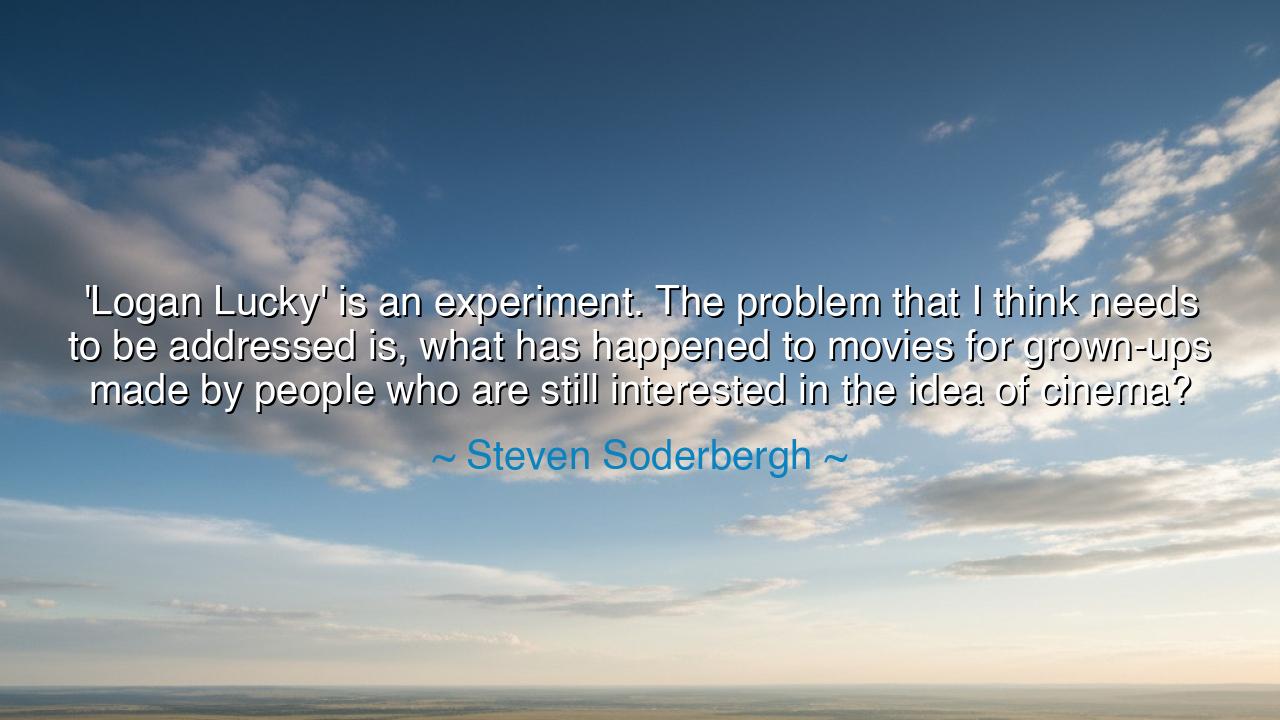
'Logan Lucky' is an experiment. The problem that I think needs
'Logan Lucky' is an experiment. The problem that I think needs to be addressed is, what has happened to movies for grown-ups made by people who are still interested in the idea of cinema?






Listen, O seekers of wisdom, for the words of Steven Soderbergh hold a reflection of the deep currents that run through the world of cinema and art. In his observation, "‘Logan Lucky’ is an experiment. The problem that I think needs to be addressed is, what has happened to movies for grown-ups made by people who are still interested in the idea of cinema?" With these words, Soderbergh touches upon a crucial issue—the fading art of creating films for adults, films that provoke thought and spark reflection, rather than simply offering entertainment. His statement is a call to action for those who still believe in the power of cinema to challenge the mind, stir the soul, and speak to the complexities of the human experience.
In ancient times, the art of storytelling was sacred. It was not merely a pastime, but a means by which ideas, virtues, and philosophies were passed down through the generations. The great philosophers, such as Socrates and Aristotle, understood that storytelling was a powerful tool for teaching, for questioning the status quo, and for exploring the depths of human nature. These tales were often filled with complex characters and moral dilemmas, designed to provoke deep thought and reflection. Yet, over time, as society progressed, stories became more simplified, more digestible, and, ultimately, more entertaining than thought-provoking. The cinema, much like the great tragedies of Athens, once had the potential to mirror life’s complexities. Soderbergh’s question, then, is one of loss—what happened to the films that dared to be more than mere entertainment?
Soderbergh’s words call attention to the fact that cinema, at its best, is not merely about spectacle or fleeting pleasure. It is about capturing something deeper—an exploration of human nature, of society’s struggles, and of the complexity of life itself. Just as the ancient Greeks used theater to explore the human condition, so too should film be a space where we confront difficult truths and wrestle with the complexities of our existence. In the wake of mass entertainment, where movies are often designed to provide a quick thrill rather than a lasting message, the true spirit of cinema seems to have faded into the background. Soderbergh’s reflection, in this sense, is both a lament and a challenge: to return to a cinema that is willing to engage deeply with its audience, to ask hard questions, and to provoke reflection, not just applause.
Consider the legacy of the great Italian filmmaker Federico Fellini, whose works transcended simple storytelling to delve into the psyche of humanity, the dreams, the fears, and the desires that drive us all. Fellini’s films were not designed to merely entertain, but to unveil the complexities of the world. His film 8½ is often regarded as one of the greatest films of all time precisely because it refused to offer easy answers. Instead, it wrestled with the very nature of creativity, identity, and the struggle to find meaning in a chaotic world. This is the kind of cinema Soderbergh refers to—the kind that not only entertains but awakens the viewer, challenges them, and forces them to reflect on their own lives and choices.
Now, let us think of Soderbergh’s own work. Films like Traffic and Sex, Lies, and Videotape challenged the conventions of the industry and confronted the complexities of modern life. His films, though at times wrapped in entertainment, were always deeply grounded in the human experience. Soderbergh’s “experiment” with Logan Lucky, a film filled with humor and absurdity, is still an attempt to reclaim the power of cinema for those who seek more than mere distraction. It is an attempt to create a film that blends entertainment with substance, that speaks to an adult audience willing to engage with complex narratives and deeper themes.
In Soderbergh’s words, we find an urgent lesson for our times: Don’t settle for shallow distractions. The world is filled with easy entertainment, but the true value of art, whether it be cinema, literature, or music, lies in its ability to engage with the heart and mind. It is not enough to merely consume stories; we must seek those that challenge us, those that provoke thought and stir our emotions. As creators, we must remember that our work has the power to shape the minds and souls of those who encounter it. Seek depth in your creations, and let them be more than just a momentary thrill; let them linger and nourish the soul.
So, young ones, take heed of Soderbergh’s challenge: Create works that matter, works that are not merely designed to entertain but to engage. Ask yourself: “What do I want my work to contribute to the world? Is it merely a fleeting distraction, or does it have something to offer that will last?” Just as Fellini, Socrates, and Soderbergh have taught us, cinema—like all art—has the power to shape the course of thought, to reflect the complexities of life, and to stir the deepest parts of our being. Make your creations something that speaks to the mind and soul, for in this way, you will create art that lasts.






AAdministratorAdministrator
Welcome, honored guests. Please leave a comment, we will respond soon